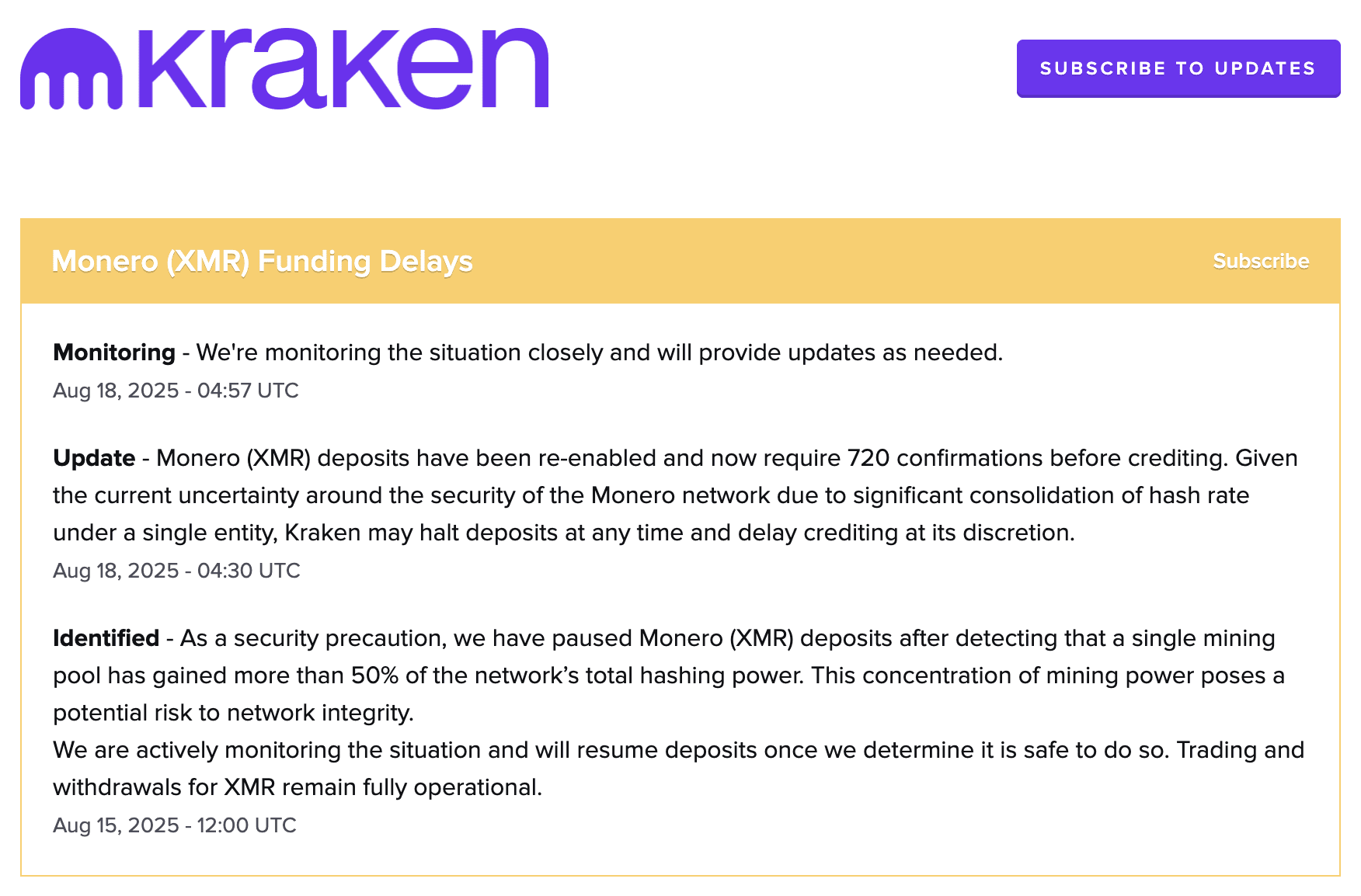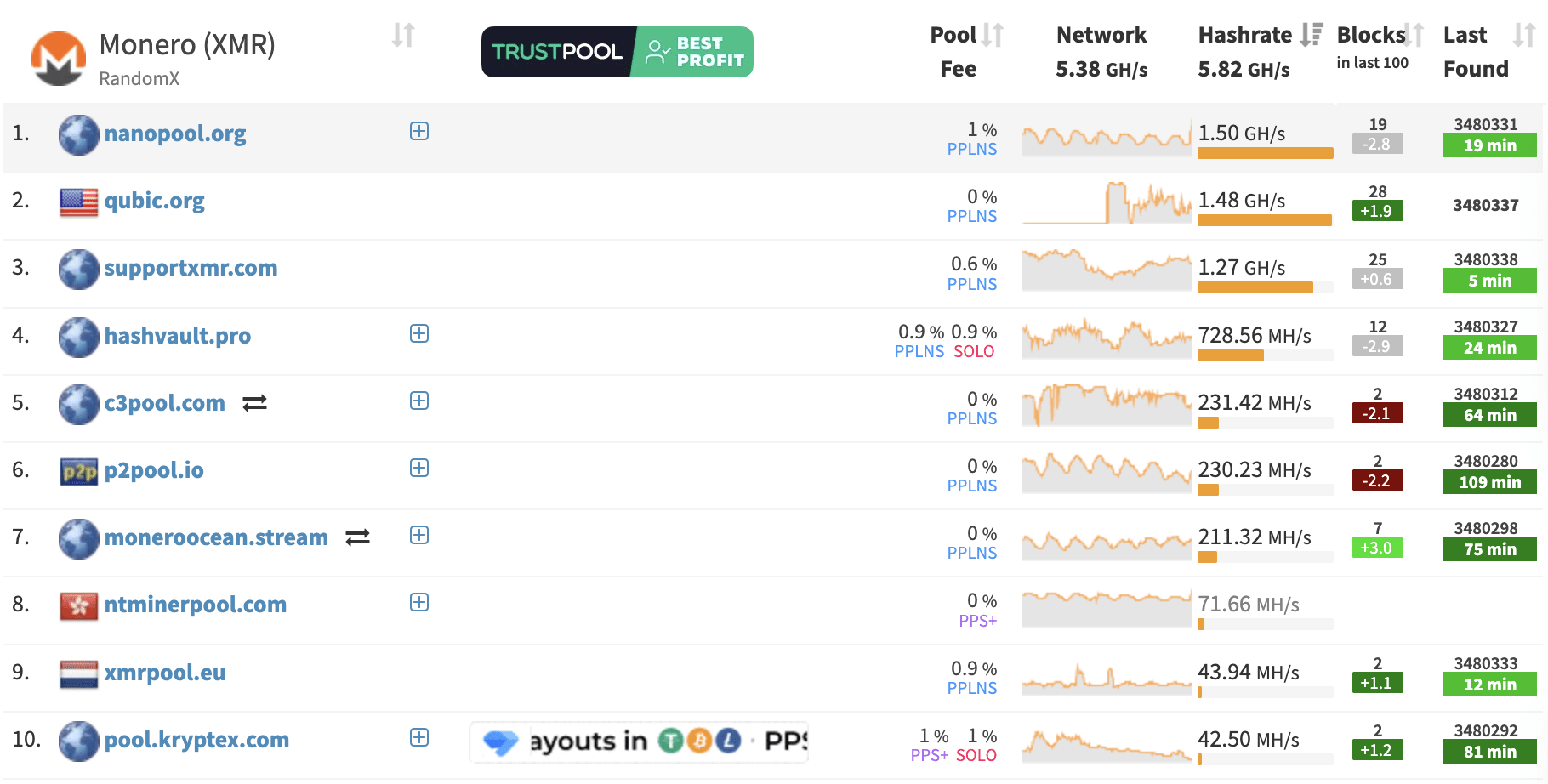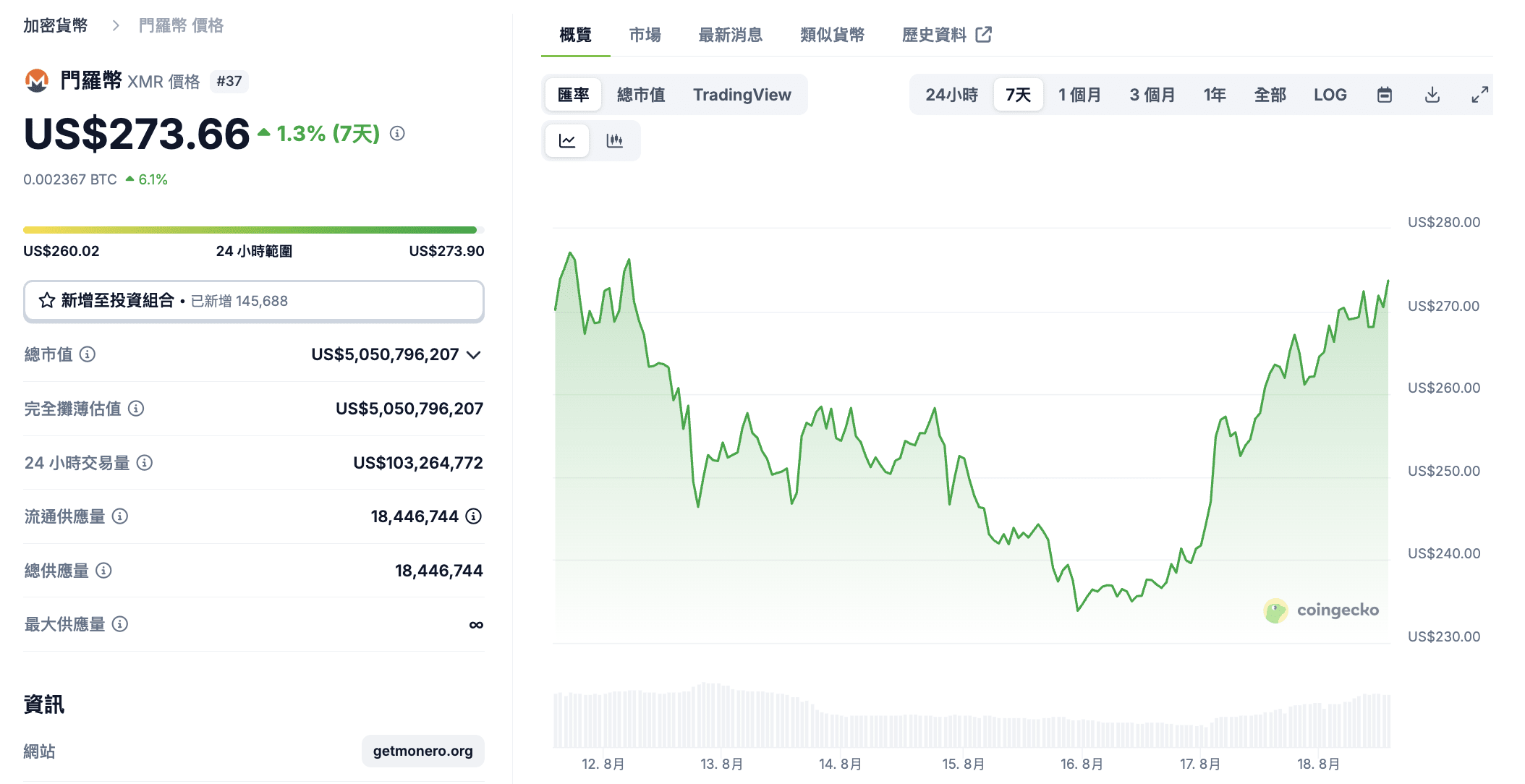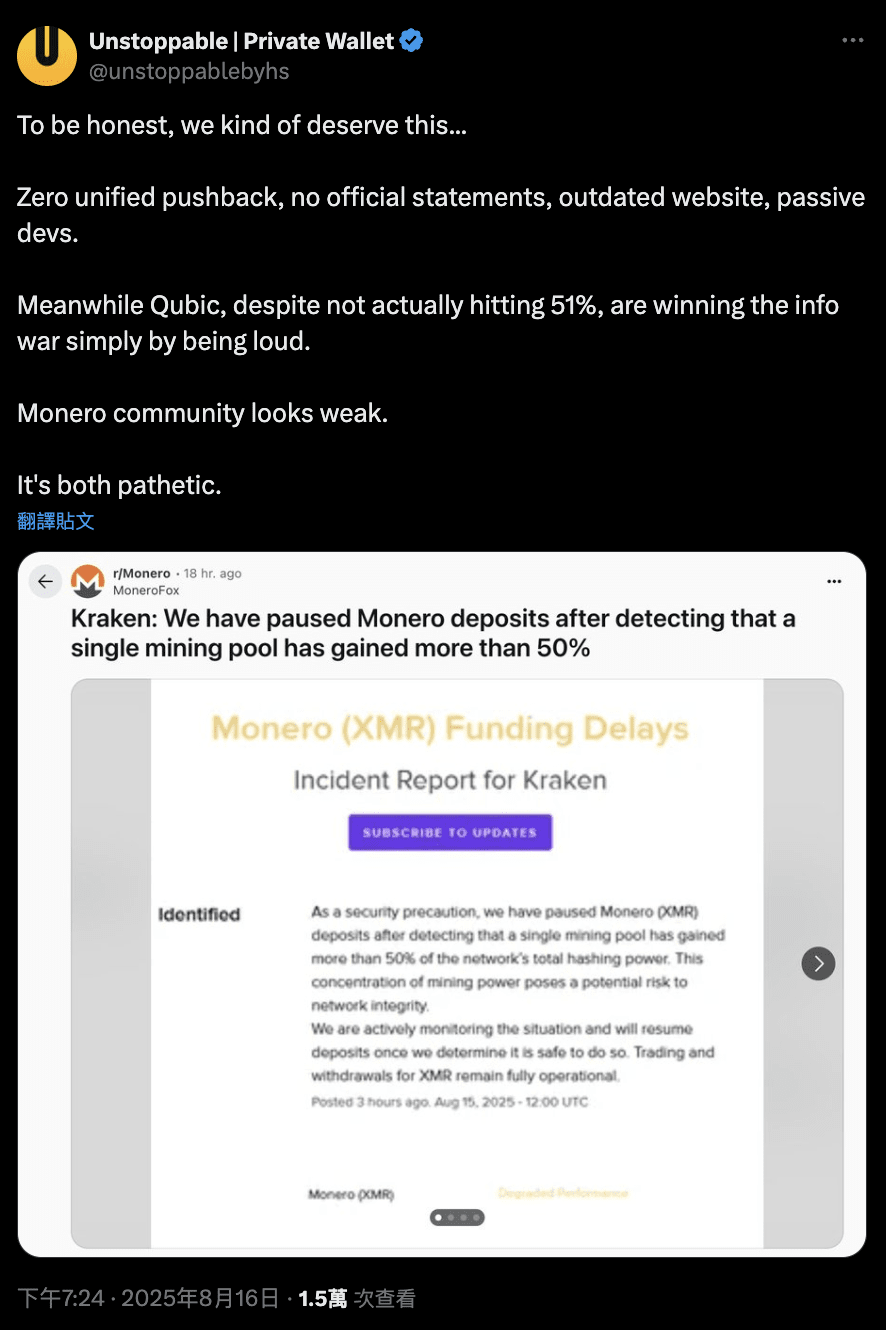Qubic successfully controls over half of Monero's hashing power, reorganizing 6 blocks raises security concerns.
Globally renowned cryptocurrency exchange Kraken announced last Friday (8/15) the suspension of Monero (Monero, $XMR) deposit services due to detecting that a single mining pool has gained over 50% of the network's total hashing power, posing a potential risk to network integrity. The exchange emphasized that $XMR's trading and withdrawal services remain operational, and deposit services will be restored once network safety is confirmed.
 Source: Kraken Kraken announced the suspension of Monero (Monero, $XMR) deposit services.
Source: Kraken Kraken announced the suspension of Monero (Monero, $XMR) deposit services.
At the heart of this incident is the AI blockchain project Qubic, which claims to have successfully executed a 51% attack on the Monero network. Qubic announced on Monday that it had achieved 51% hashing power dominance over Monero after a month-long technical confrontation, reorganizing the blockchain, restructuring 6 blocks, and isolating about 60 blocks. According to Mining Pool Stats data, Qubic has currently reduced its controlled hashing power from 2.04 GH/s to 1.48 GH/s, holding a 27.5% market share of the total network hashing power of 5.38 GH/s.
 Source: Mining Pool Stats Qubic currently has a hashing power of 1.48 GH/s, holding a 27.5% market share of the total network hashing power of 5.38 GH/s.
Source: Mining Pool Stats Qubic currently has a hashing power of 1.48 GH/s, holding a 27.5% market share of the total network hashing power of 5.38 GH/s.
A 51% attack refers to when a single miner or mining pool gains control of more than half of the blockchain's hashing power, allowing for double spending or rearranging recent transactions. Qubic founder Sergey Ivancheglo stated that this incident highlights the key risks of the network and emphasizes the importance of preventing any single miner from exceeding 25% of the total hashing power.
Further Reading
Monero's price dropped 25% over the week! Qubic pool claims to have conducted a 51% attack, experts warn of potential collapse.
The Monero community questions the authenticity of the attack, with prices rising contrary to expectations.
Despite Qubic claiming to have successfully executed the attack, the Monero community has strongly questioned and countered this. Critics believe that Qubic never truly exceeded 35% of the network's hashing power and only employed selfish mining strategies rather than complete control. The Monero community even launched a distributed denial-of-service attack (DDoS) against Qubic, causing its hashing power to plummet from 2.6 GH/s to 0.8 GH/s.
However, Qubic subsequently restored its hashing power and regained control of the network. The project described this incident as a pivotal moment in the cryptocurrency industry, emphasizing the significance of a $300 million AI protocol successfully taking over a $6 billion privacy protocol.
It is worth noting that despite facing attack accusations and deposit suspensions, Monero's market performance has shown resilience. According to CoinGecko data, the $XMR price has increased in the past seven days, and as of the time of writing, the price is $273.66, almost returning to pre-attack price levels, indicating that investors still have sufficient confidence in it.
 Source: CoinGecko $XMR price has increased in the past seven days, currently priced at $273.66.
Source: CoinGecko $XMR price has increased in the past seven days, currently priced at $273.66.
The Qubic community votes to target Dogecoin as the next attack target.
After successfully controlling the Monero network, Qubic founder Sergey Ivancheglo initiated a vote in the community to ask which blockchain utilizing ASIC mining and proof-of-work mechanism should be targeted for a 51% attack next, with options including Dogecoin, Kaspa, and Zcash.
Voting results show that Dogecoin, with a market cap of over $35 billion, received over 300 votes in support, far exceeding the total votes of other networks. Ivancheglo announced in a post on the X platform on Sunday: 'The Qubic community has chosen Dogecoin.'
 Source: X/@c___f___b Qubic founder Sergey Ivancheglo stated that the Qubic community has chosen Dogecoin as the next attack target.
Source: X/@c___f___b Qubic founder Sergey Ivancheglo stated that the Qubic community has chosen Dogecoin as the next attack target.
This decision could pose alarming implications for digital asset blockchains that rely on mining. Qubic's successful attack on Monero, a privacy blockchain, has shocked the cryptocurrency community, and now targeting another proof-of-work cryptocurrency could further highlight the security challenges faced by small and medium-sized PoW networks.
Exchanges take precautionary measures, highlighting the centralization risks of privacy coins.
In response to this attack, Kraken took precautionary measures to suspend Monero deposits, but kept withdrawals and trading functions operational. The exchange stated that it will closely monitor the situation and will restore deposit services once network stability is confirmed.
Monero, as a privacy-focused cryptocurrency, is able to hide key details such as the sender, receiver, and amount of transactions. Its strong anonymity features make it popular among users seeking secure and untraceable transfers. However, this incident exposed the vulnerability of medium-sized proof-of-work networks facing majority control operations.
The privacy wallet Unstoppable Wallet criticized the Monero community for its lack of unified response, pointing out that 'zero unified counterattacks, no official statements, outdated websites, and passive developers' make the Monero community appear weak, while Qubic, despite not truly achieving 51%, won in the information war. As exchanges like Kraken take protective measures, the broader cryptocurrency community needs to rethink resilience strategies for networks with fewer miners.
 Source: X/@unstoppablebyhs Criticism of the Unstoppable Wallet for its lack of unified response to the Monero community.
Source: X/@unstoppablebyhs Criticism of the Unstoppable Wallet for its lack of unified response to the Monero community.
'Kraken suspends XMR deposits, is breaching Monero not enough, is Qubic's next target Dogecoin?' This article was first published in 'Crypto City.'



